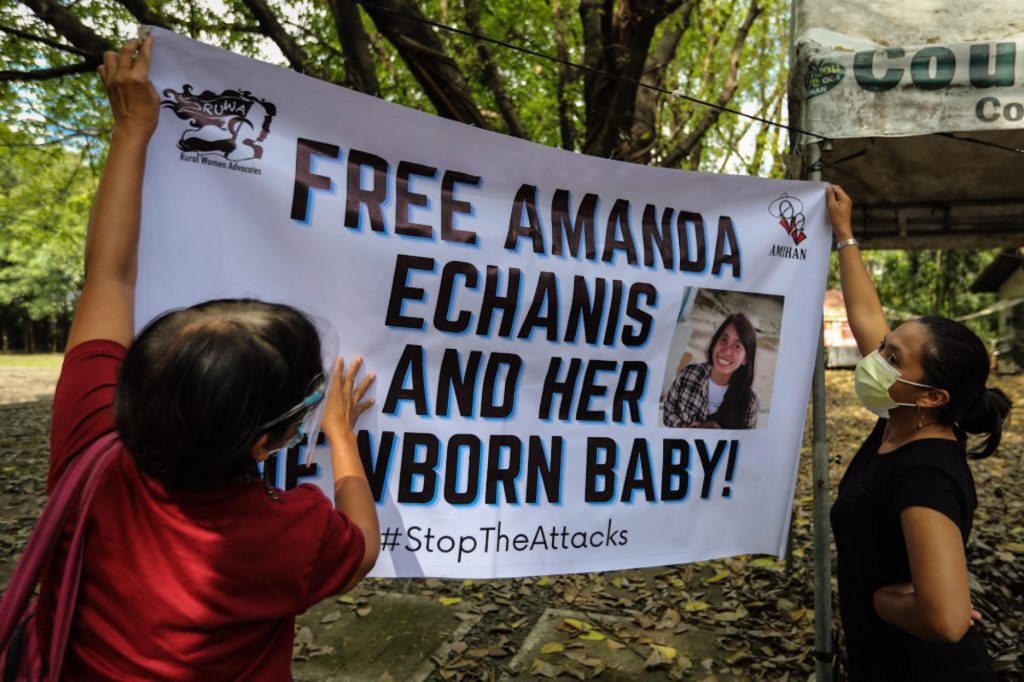In the comfort of his mother’s arm, the Philippines’ youngest “political prisoner” was sound asleep as the country greeted the new year.
There was no traditional “noche buena” feast on the table. It was a silent turn of the year. There were no family nor friends in the detention cell where the baby, Randall Emmanuel, spent the holidays.
The 2-month-old child is the son of Amanda Echanis, a peasant organizer who was arrested in the town of Baggao in Cagayan province on Dec. 2. She was accused of being a communist rebel.
State security forces claimed that Echanis was carrying not just her newborn child when police and soldiers staged a raid. She was supposed to be hiding a high-caliber rifle, some ammunition, and explosives.
Authorities accused the 32-year-old mother of being a member of the communist-led New People’s Army operating in the northern Philippines.
In the capital Manila, Echanis’ relatives and friends were also not into celebrating the New Year like they used to.
“We just ran out of reasons to celebrate,” said Nen, Echanis’ childhood friend.
Nen said she’s worried about Randall.
“A detention cell will never become conducive for a lactating mother and a newborn child,” she said.
What is worse, the future godmother of the child said, a detention cell “is not the worst.”
“What’s worse is when authorities force to separate the baby from the mother,” said Nen.

It happened in October last year when 3-month-old Baby River Emmanuelle died due to lung failure following a bacterial infection and pneumonia.
The mother’s counsel said the infant’s death could have been prevented if she was not separated from her mother, Reina Mae Nasino, a 23-year-old urban poor community organizer.
Authorities arrested Reina Mae on Nov. 5, 2019, allegedly for illegal possession of firearms and explosives.
At the time of her arrest, she was pregnant. She gave birth to her daughter, Baby River Emmanuelle, in prison.
“The government denied the child of the mother’s breast milk, which could have kept her healthy and prevented her untimely demise,” said lawyer Katherine Panguban of the National Union of People’s Lawyers.
Panguban said the death of the child should have not happened if the government followed domestic and international laws that promote and encourage the breastfeeding of infants.
The country’s Expanded Breastfeeding Law states that government agencies and private entities should “implement measures that would ensure breastfeeding activities in their jurisdiction.”
“Nowhere in the said legislation distinguishes and discriminates against infants whose mothers are detention prisoners or otherwise judicially deprived of their liberties,” said the lawyer.
Women prisoners with newborn babies are also covered by UN’s Rules for the Treatment of Women Prisoners and Non-custodial Measures for Women Offenders.
The so-called Bangkok Rules is a set of 70 rules focused on the treatment of female offenders and prisoners adopted by the United Nations General Assembly on Dec. 22, 2010.
Panguban, however, said jail facilities in the Philippines and the country’s policies covering nursing mother detainees “do not work for the best interest of the children.”
Fearful that what happened to Reina Mae would happen to Echanis, the “Free Amanda Echanis Network” of friends and family members called for her immediate and unconditional release.
Echanis was also once one of the youngest political prisoners when her parents, both activists, were arrested and detained in 1990. She was only two years old then.
During that time, arrested couples stayed together until the wife was released ahead of the husband “to allow her to attend to their family and her imprisoned husband.”
Echanis stayed inside a detention facility for six months and was released with her mother, Erlinda, in 1991.
Baby Randall Emmanuel is named after his grandfather, long-time peasant leader and activist Randall “Randy” Echanis who was found dead inside a rented house in Quezon City on Aug. 10, 2020.
Baby Randall Emmanuel faces uncertainties inside the detention cell. He has become a victim of a system that his grandfather and his mother’s uncle had fought against.






